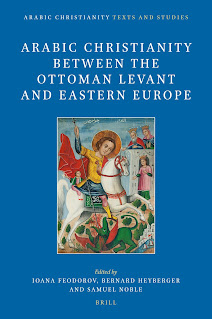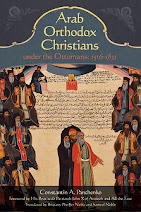Arabic original here.
The Church and Ramadan in Lattakia:
Sharing the Loaf in this Good Country
by Bilal Salitin
Since the beginning of Ramadan, Georgette has been working with a group of women to prepare food for people who are fasting at the kitchen of the Church of Saint Barbara in the Ali Jamal neighborhood of Lattakia, which every day prepares hundreds of meals that are distributed to the needy.
The kitchen is part of a series of initiatives that have been launched in Syria with the start of the month of fasting and has been taken up by the Greek Orthodox Patriarchate of Antioch and All the East in cooperation with the local community in the coastal province, which has witnessed significant community activities of late.
Every day, the kitchen offers hundreds of hot meals before the time for breaking the fast, so that they will be on the tables of those fasting, both those newly-arrived in Lattakia and native residents. The meals vary daily and include rice and bulghur plates, freekeh and mansaf, alongside dates and yogurt, the favorite food during Ramadan.
The kitchen's work regimen is based on fixed principles that do not require those who are fasting to come in order to get their meal. Instead, they are brought to their homes by a group of volunteers who go around target neighborhoods, handing out cards to specific families in cooperation with local leaders and the imams of mosques. The following day, they come back with meals that are delivered and they take back the cards in order to distribute them to other families the next day, such that those who benefit change every day and the geographic area of those who receive food is widened.
The kitchen carries many messages. Its operators have given it the name "Sahn [dish]," which they follow with "from the goodness of this good country." Mike Awad, one of the volunteers in this initiative, says that "this country is rich in natural goods and human giving. We are not offering what we offer at the kitchen in our own name or in the name of the Patriarchate, but in the name of Syria and the Syrians."
Katia Khasho, who lost her son during the Syrian War, is eager to be with her colleagues in the kitchen on the anniversary of his passing, which this year falls on the third day of Ramadan, to cook food with them, pack it, and distribute it with her own hands. Khasho tells as-Safir, "The best thing I can do for the soul of my son is to volunteer to serve Syrians and to do everything in my ability for the comfort and happiness of the children of my country. This kitchen run by the Patriarchate has given me the opportunity to take on this role, with great happiness."
This initiative embraces volunteers from all religions and communities who share in efforts that are in creating in strength thanks to the local community, which offers its support. Fasting does not prevent volunteer Nour Matraji from taking part in this work, which gives her "increased capacity for patience and work."
The Patriarchate's initiative is not unique in Latttakia, as several similar initiatives and open kitchens have developed, but its particularity lies in the fact that it is an initiative from the Church, while war rages and the weight of incitement multiplies.
The priest George Hosh states that "This is our Middle Eastern culture. Today the Orthodox Church is not just for the Christians, but for all Syrians, whose pain she regards as her own pain."
Hosh adds, "What the Patriarchate is doing is part of Middle Easterners' culture of a shared life, which goes back in history to Patriarch Gregory [IV Haddad] the Damascene, who distributed bread to Muslims and Christians when Damascus was under siege from the French. He insisted on this, despite the threat of the patriarchate's stores running out of flout. His motto then was sharing the loaf between the children of the same country and the good land."
It should be mentioned that charity meals during Ramadan are considered a community tradition in which Syrians have persisted for decades. Despite the difficulty of present circumstances, civil society and religious organizations in Lattakia are offering thousands of meals to those who are fasting every day.
The Church and Ramadan in Lattakia:
Sharing the Loaf in this Good Country
by Bilal Salitin
Since the beginning of Ramadan, Georgette has been working with a group of women to prepare food for people who are fasting at the kitchen of the Church of Saint Barbara in the Ali Jamal neighborhood of Lattakia, which every day prepares hundreds of meals that are distributed to the needy.
The kitchen is part of a series of initiatives that have been launched in Syria with the start of the month of fasting and has been taken up by the Greek Orthodox Patriarchate of Antioch and All the East in cooperation with the local community in the coastal province, which has witnessed significant community activities of late.
Every day, the kitchen offers hundreds of hot meals before the time for breaking the fast, so that they will be on the tables of those fasting, both those newly-arrived in Lattakia and native residents. The meals vary daily and include rice and bulghur plates, freekeh and mansaf, alongside dates and yogurt, the favorite food during Ramadan.
The kitchen's work regimen is based on fixed principles that do not require those who are fasting to come in order to get their meal. Instead, they are brought to their homes by a group of volunteers who go around target neighborhoods, handing out cards to specific families in cooperation with local leaders and the imams of mosques. The following day, they come back with meals that are delivered and they take back the cards in order to distribute them to other families the next day, such that those who benefit change every day and the geographic area of those who receive food is widened.
The kitchen carries many messages. Its operators have given it the name "Sahn [dish]," which they follow with "from the goodness of this good country." Mike Awad, one of the volunteers in this initiative, says that "this country is rich in natural goods and human giving. We are not offering what we offer at the kitchen in our own name or in the name of the Patriarchate, but in the name of Syria and the Syrians."
Katia Khasho, who lost her son during the Syrian War, is eager to be with her colleagues in the kitchen on the anniversary of his passing, which this year falls on the third day of Ramadan, to cook food with them, pack it, and distribute it with her own hands. Khasho tells as-Safir, "The best thing I can do for the soul of my son is to volunteer to serve Syrians and to do everything in my ability for the comfort and happiness of the children of my country. This kitchen run by the Patriarchate has given me the opportunity to take on this role, with great happiness."
This initiative embraces volunteers from all religions and communities who share in efforts that are in creating in strength thanks to the local community, which offers its support. Fasting does not prevent volunteer Nour Matraji from taking part in this work, which gives her "increased capacity for patience and work."
The Patriarchate's initiative is not unique in Latttakia, as several similar initiatives and open kitchens have developed, but its particularity lies in the fact that it is an initiative from the Church, while war rages and the weight of incitement multiplies.
The priest George Hosh states that "This is our Middle Eastern culture. Today the Orthodox Church is not just for the Christians, but for all Syrians, whose pain she regards as her own pain."
Hosh adds, "What the Patriarchate is doing is part of Middle Easterners' culture of a shared life, which goes back in history to Patriarch Gregory [IV Haddad] the Damascene, who distributed bread to Muslims and Christians when Damascus was under siege from the French. He insisted on this, despite the threat of the patriarchate's stores running out of flout. His motto then was sharing the loaf between the children of the same country and the good land."
It should be mentioned that charity meals during Ramadan are considered a community tradition in which Syrians have persisted for decades. Despite the difficulty of present circumstances, civil society and religious organizations in Lattakia are offering thousands of meals to those who are fasting every day.







